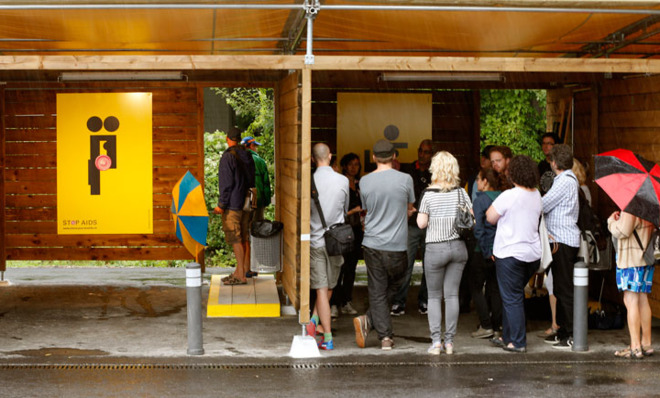Everyone loves Zurich's sex boxes. Except the people using them.
Swiss prostitutes say the boxes are hurting business

A free daily email with the biggest news stories of the day – and the best features from TheWeek.com
You are now subscribed
Your newsletter sign-up was successful
On paper, Zurich's drive-through sex boxes sound like a prostitute's dream. Spaces equipped with showers and security alarms that can be rented for less than $6 a night seem like an efficient, affordable, and safe way for prostitutes to protect themselves and their business without the fear of violent pimps. Indeed, two months after their establishment, the sex boxes are being hailed as a great success by everyone.
Everyone that is, except the folks actually using them.
The voter-approved project, which cost $2.6 million, was designed to alleviate citizens' fears regarding prostitution. Although prostitution has been legal in Switzerland since 1942, locals were increasingly uneasy with the "presence of sex workers in residential areas," wrote Dr. Brooke Magnanti at The Telegraph. They also wanted create a safer space for prostitutes that would protect them from violence and assault.
The Week
Escape your echo chamber. Get the facts behind the news, plus analysis from multiple perspectives.

Sign up for The Week's Free Newsletters
From our morning news briefing to a weekly Good News Newsletter, get the best of The Week delivered directly to your inbox.
From our morning news briefing to a weekly Good News Newsletter, get the best of The Week delivered directly to your inbox.
This past week, government officials have been praising the sex boxes for successfully addressing all those concerns. "After two months, I can say this guarded prostitution is working," Michael Herzig, the director of social services for sex workers in Zurich, told the AFP. "We do not have any major problems, such as with pimps, violence, or the neighborhood."
The sex boxes even have friendly PSAs reminding people to use condoms, as well as on-site doctors and social workers. Who wouldn't love these magical sex boxes?
Well, for one, the prostitutes. While Herzig sees encouraging sex box numbers, others believe they are lackluster. On average, 14 of the 30 available sex boxes are used a night, which means they're operating under 50 percent capacity. In turn, this suggests the prostitutes don't love the program.
UK Metro reported that prostitutes have complained that the sex boxes are "bad for business" and "not worth our while." More specifically, prostitutes are complaining that the sex boxes attract few customers, writes Malcolm Curtis at Switzerland's The Local.
A free daily email with the biggest news stories of the day – and the best features from TheWeek.com
And it turns out, the johns feel similarly. Metro quoted a letter printed in a local newspaper in Zurich from a man complaining, "On a Saturday night, there were only three prostitutes there. That is not really a lot of choice."
Prostitutes also say they are taking a financial and emotional hit from the sex boxes. Director of Switzerland's Salvation Army prostitute rehabilitation program, Cornelia Zurrer Ritter, told Swiss newspaper Neue Zurcher Zeitung that the women who use sex boxes "make less money" and find the "working conditions inhumane."
While the sex boxes are safe, they are also, well, wooden boxes. Upon closer examination, they look more like unfinished sheds without any place to lie down. It's understandable that prostitutes find saloons and lounges that let them work indoors (and have pillows) more accommodating. In fact, it's predicted that many of them are just moving to these locales.
However, Zurich has been cracking down on brothels, closing ones that have been open for less than 20 years. Thus, more prostitutes end up out of work, especially if they are ditching the sex boxes to go indoors.
And unfortunately, when prostitutes move indoors and off the streets, they are both more vulnerable and further removed from help resources. "It has become even more difficult to get in contact with the prostitutes," the director of City Mission told Neue Zurcher Zeitung. "When the scene shifts, the women no longer where to find us."
Emily Shire is chief researcher for The Week magazine. She has written about pop culture, religion, and women and gender issues at publications including Slate, The Forward, and Jewcy.
-
 How the FCC’s ‘equal time’ rule works
How the FCC’s ‘equal time’ rule worksIn the Spotlight The law is at the heart of the Colbert-CBS conflict
-
 What is the endgame in the DHS shutdown?
What is the endgame in the DHS shutdown?Today’s Big Question Democrats want to rein in ICE’s immigration crackdown
-
 ‘Poor time management isn’t just an inconvenience’
‘Poor time management isn’t just an inconvenience’Instant Opinion Opinion, comment and editorials of the day